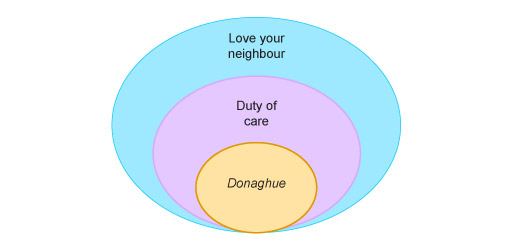1.3 The reasoning
Activity 2 The reasoning in the judgments
Read again the summaries of Lord Atkin’s and Lord Buckmaster’s opinions in Boxes 2 and 3. Note down for each whether you think they are engaging in one or more forms of logical reasoning: deductive, inductive and/or reasoning by analogy. If so, why do you think this? Consider whether there might be the appearance of logical reasoning which is not actually present in the decision-making process.
Comment
Lord Atkin. It is possible to argue that Atkin is using all three forms of reasoning: deductive, inductive and reasoning by analogy. What he says he is doing is using the different specific examples of duty of care from the cases to establish a general principle that can be used to show that there is a duty of care in Donoghue. This is inductive reasoning. However, he also takes a very general premise, which is to love your neighbour, and deduces from this the rule that there is a duty of care in this case. This is similar to deductive reasoning, represented in Figure 4.
Finally, we have seen that common law is most associated with reasoning by analogy, because it requires picking those cases most similar to the current case based on the factors in them that are considered most important. While Atkin does not represent this as his reasoning, he clearly makes decisions based on his selection of different parts of the cases that he considers to be analogous to the case of Donoghue and, just as importantly, he excludes cases that he does not think are analogous. He then transfers the additional characteristic in the analogous cases, that of the existence of a duty of care, over to the situation in Donoghue. This is reasoning by analogy and probably better describes what he is doing with the cases than straightforward inductive reasoning because his choice of analogous cases is the most important element in the process.
Lord Buckmaster. This is presented as a fairly clear case of deductive reasoning from the general to the specific. The pre-existing general rule is that there is no duty of care outside a contract. There are exceptions to this rule. The circumstances in Donoghue do not fall within these exceptions. Therefore, they fall within the general rule, so there is no duty of care. This might be represented as the following syllogism:
- major premise – for situations falling within the general rule there is no duty of care
- minor premise – the situation in Donoghue falls within the general rule (and not the exceptions)
- conclusion – therefore there is no duty of care in Donoghue.
This is deductive reasoning using legal rules, but there is a possibility that Buckmaster might be deducing an outcome from the general and arguably non-legal (social and economic) principle that businesses should not be held responsible for so many people and potential claims when manufacturing products. The case law is then chosen and interpreted to fit this preconceived principle. This is similar to what Lord Atkin is doing with the ‘love your neighbour’ principle. You might see this as enforcing the purpose behind the law or bringing non-legal factors into legal decisions, or both.
As we have seen, the appearance of deductive reasoning can be misleading in judicial reasoning. Buckmaster, like Atkin, makes choices about the cases he thinks are relevant and the most important parts of them. He is reasoning by analogy when he draws comparisons with some cases and not others based on the information he considers important. He then transfers an additional characteristic, no duty of care, across from those cases that are analogous.
The question that arises from the end of the previous activity is how logical and legal the reasoning actually is. We can see that the more logical and certain forms of reasoning are presented more clearly by the lords while less certain forms are more hidden. But Lords Atkin and Buckmaster make many choices when they come to their completely opposite conclusions: choices as to which cases to look at, which parts of those cases, where to find their ratio decidendi, how to categorise them, what are the most important facts, how they relate to the current case, and so on. They also have economic, social and moral principles in mind, which influence their choices, and exist outside of a strict legal reasoning process. In light of this is there really any certainty as to what the judges will declare the law to be in any new case, based on previous cases and legislation?
You should now watch the following video, which explores the case of Donoghue, judicial opinion and ratio.

